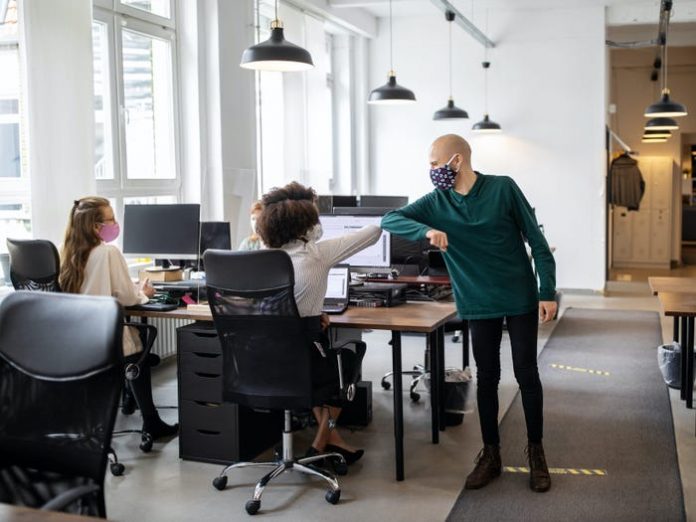Employer COVID-19 safety measures influenced worker precautions even when they were not on the clock, according to a new study out of Washington State University.
The study found that workplace cultures that adopted COVID-19 prevention measures, such as daily health checks and encouraging sick workers to stay home, resulted in less “sickness presenteeism” or going places when feeling ill. The effect was found both inside and outside of work – meaning fewer employees with COVID-19 symptoms showed up to work and other public places like grocery stores, gyms and restaurants.
The same held true for attitudes toward the COVID-19 prevention measures recommended by the Centers for Disease Control and Prevention such as mask wearing and social distancing: employees working for companies with strong COVID-19 prevention measures were more likely to have positive attitudes toward the CDC guidelines.
“The workplace COVID-19 climate had a direct effect on shaping employee attitudes towards the personal, preventative health actions that the CDC recommends,” said Tahira Probst, WSU psychology professor and lead author of the study published in the Journal of Occupational and Environmental Medicine. “Public health officials and employers should be aware of the impact that organizations and workplaces can have on stemming the tide of the pandemic. It’s not just that employers have an impact on transmission that occurs within the workplace, but they are also influencing those same employees’ attitudes and behaviors outside of the workplace.”
For the study, the researchers surveyed more than 300 working adults recruited on the Amazon Mechanical Turk crowdsourcing website in three waves during the pandemic holiday surge. They first surveyed the workers in October 2020 to assess the COVID-19 climate of their workplaces; then in December 2020, about their attitudes toward the CDC prevention guidelines, and finally in February 2021, about their work and non-work behaviors when sick or exposed to COVID-19.
The study found a significant connection between the workplace COVID-19 climate, employee attitudes toward the pandemic prevention measures, and ultimately whether they showed up to work or other public places while feeling ill with COVID-19 symptoms or following known exposure to the virus.
The respondents came from 44 U.S. states and Washington D.C. While the survey did not use a nationally representative sample, the respondents’ demographics–with a median age of 40, 59% male and 76% white–aligned well with the general labor force with a median age of 40-44, 53% male and 78% white. However, the survey group was generally more highly educated with 67% reporting having a college degree or higher, compared to 40% in the general labor force.
During the survey period, about half of the respondents were working onsite and half remotely. Interestingly, the study found that even the remote workers were influenced by their employers’ COVID-19 workplace climate. Remote workers were less likely to frequent public spaces after exposure to the virus or while ill when working for a company with strong prevention measures in place.
The researchers noted that the many U.S. organizations have long-standing cultures stigmatizing sick leave and encouraging sickness presenteeism. The good news, the authors point out, is that workplaces can help curb the spread of COVID-19 by actively encouraging sick employees to stay home, instituting daily health checks, and adopting other CDC workplace health and safety precautions.
The pandemic has forced some organizations to examine their culture around sick leave, and Probst is interested to see if this will become a long-term change.
“One of the more enduring consequences of the pandemic might be that organizations not only offer more sick leave but also encourage employees to stay home if they’re sick,” said Probst. “Frankly, prior to COVID-19, a lot of our culture has been: ‘unless you’re gravely ill and can’t get out of bed, you should be at work.’ That behavior spreads diseases and ultimately reduces productivity. We’re hopeful that the pandemic might institute a re-thinking of this norm moving forward.”








